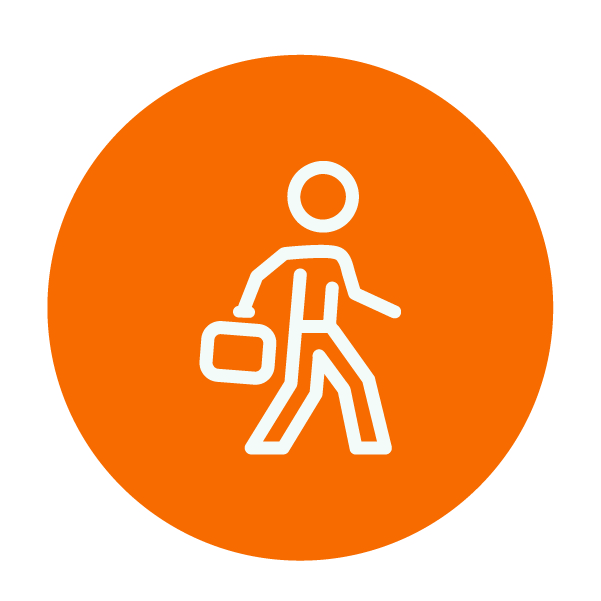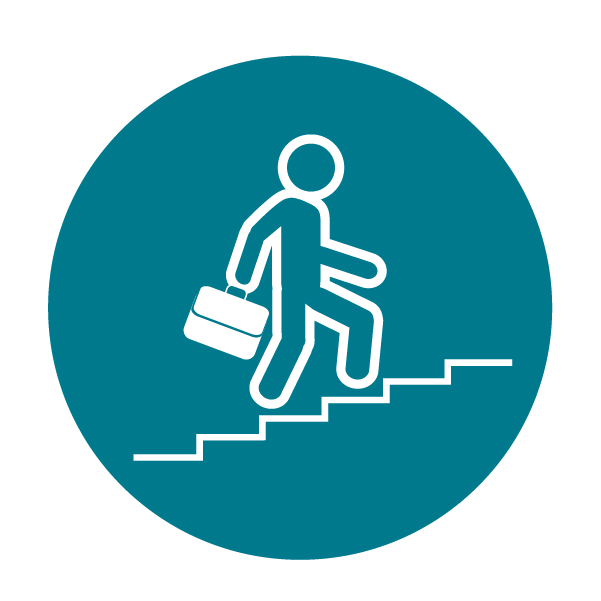Access to postsecondary education can make all the difference in one’s life trajectory. Here, we spotlight some of Mathematica’s new partnerships to assess strategies designed to increase educational attainment. These projects will help policymakers, states, and programs pursue a path to progress.
 Measuring how public high schools prepare students for college and careers. What if high schools were graded on how well they promoted students’ long-term outcomes? Mathematica is partnering with the Louisiana Department of Education and the Walton Family Foundation to find out. This new two-year project will provide Louisiana with information on each high school’s promotion power—its impact on long-term outcomes such as postsecondary education and earnings. With the new measure of promotion power, Louisiana will be the first state in the nation that can identify individual high schools that move the needle on students’ long-term outcomes.
Measuring how public high schools prepare students for college and careers. What if high schools were graded on how well they promoted students’ long-term outcomes? Mathematica is partnering with the Louisiana Department of Education and the Walton Family Foundation to find out. This new two-year project will provide Louisiana with information on each high school’s promotion power—its impact on long-term outcomes such as postsecondary education and earnings. With the new measure of promotion power, Louisiana will be the first state in the nation that can identify individual high schools that move the needle on students’ long-term outcomes.
- Examining the impact of the Knowledge is Power Program (KIPP) on college entry and success. KIPP operates the largest network of public charter schools in the United States, serving predominantly low-income and minority children with the mission of preparing students for success in college. Building on our work to bring objective data and research to understand KIPP’s impacts, we will conduct a rigorous, independent analysis of the network’s impacts on students’ college enrollment and persistence. This follow-up study for the Laura and John Arnold Foundation will track students who participated in our first study of KIPP, a widely cited randomized controlled trial that revealed KIPP middle schools had large positive impacts on students’ academic achievement. This new study will provide insights into whether KIPP’s success in improving these students’ middle school test scores translated into positive impacts on their enrollment in college.
 Helping working families reach their education and career goals. We are studying the Working Students Success Network, a strategy that brings together services and supports to put students on a path to securing marketable skills and credentials for entering the workforce and achieving economic success. Community colleges in the network help students improve their financial and budgeting skills and develop and implement career plans. This study for the Annie E. Casey Foundation will build on our first study to look more deeply at equity and inclusion issues as well as institutional and cultural changes to reach the initiative’s goals. We will also look at how students’ experiences vary by race, English language fluency, and immigration status.
Helping working families reach their education and career goals. We are studying the Working Students Success Network, a strategy that brings together services and supports to put students on a path to securing marketable skills and credentials for entering the workforce and achieving economic success. Community colleges in the network help students improve their financial and budgeting skills and develop and implement career plans. This study for the Annie E. Casey Foundation will build on our first study to look more deeply at equity and inclusion issues as well as institutional and cultural changes to reach the initiative’s goals. We will also look at how students’ experiences vary by race, English language fluency, and immigration status.
 Examining the promise of free tuition programs for adult learners. Nearly one of every six U.S. residents between the ages of 25 and 64 has some education beyond high school but has not yet earned a degree. Many others lack a critical credential such as a certificate, certification, or associate degree that would help them earn a living wage. But the cost of higher education keeps it out of reach for too many adult learners, and even those who qualify for tuition assistance for targeted programs face additional barriers to enrolling and completing one. With the help of nearly $4 million in Adult Promise grants from the Lumina Foundation, five states that provide tuition-free pathways—often called Promise Programs—have embarked on a collaborative multi-year effort to create online tools to address non-financial barriers. The initiative will also outline strategies for addressing disparities in educational outcomes by race and ethnicity; offer guided pathways to help ensure higher completion rates; and publicly track, share, and evaluate the effectiveness of these efforts. Mathematica will work alongside the Lumina Foundation to help guide the implementation of these pilot programs and conduct a multifaceted evaluation to provide lessons for future replication and scaling.
Examining the promise of free tuition programs for adult learners. Nearly one of every six U.S. residents between the ages of 25 and 64 has some education beyond high school but has not yet earned a degree. Many others lack a critical credential such as a certificate, certification, or associate degree that would help them earn a living wage. But the cost of higher education keeps it out of reach for too many adult learners, and even those who qualify for tuition assistance for targeted programs face additional barriers to enrolling and completing one. With the help of nearly $4 million in Adult Promise grants from the Lumina Foundation, five states that provide tuition-free pathways—often called Promise Programs—have embarked on a collaborative multi-year effort to create online tools to address non-financial barriers. The initiative will also outline strategies for addressing disparities in educational outcomes by race and ethnicity; offer guided pathways to help ensure higher completion rates; and publicly track, share, and evaluate the effectiveness of these efforts. Mathematica will work alongside the Lumina Foundation to help guide the implementation of these pilot programs and conduct a multifaceted evaluation to provide lessons for future replication and scaling.
- Connecting low-income Californians with the skills needed for the growing middle-skill economy.
In California, 1.4 million middle-skill jobs are unfilled but just out of reach for many low-wage workers. To help ensure Californians with low incomes are ready for, connected to, and able to succeed in jobs that can sustain them and their families, the James Irvine Foundation has invested more than $10 million since March 2018 through its five-year Better Careers initiative. Working closely with the foundation, Mathematica will study the impacts of Better Careers’ core elements: building strong employer partnerships, providing targeted vocational training, developing soft skills, and providing comprehensive support services to help participants prepare for and succeed in their careers.
- Publishing high quality, up-to-date information about college costs in California. Although economic success might hinge on higher education, spiraling college costs put college out of reach for many. California, which has a long history of working to keep college affordable for residents, is administering the Student Expenses and Resources Survey for the first time in more than a decade, which will provide families with timely, accessible information about college costs. The survey will also help the state update student expense budgets and gain insights into regional differences across the state in students’ financial needs and resources, including housing and food. The College Futures Foundation supports this survey and selected Mathematica to provide technical assistance to the state.
Learn more about how Mathematica helps our clients on their journey from inquiry to insight through data, analytics, evaluation, and evidence-based technical assistance.
